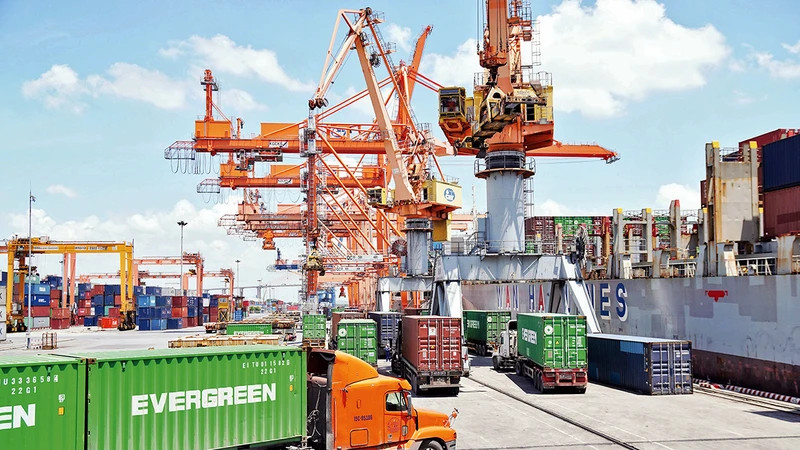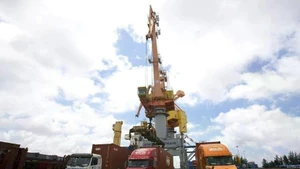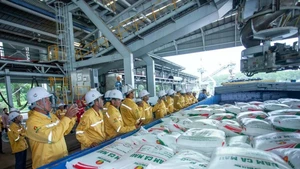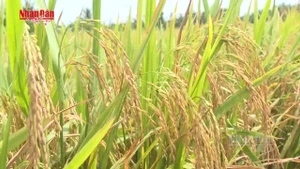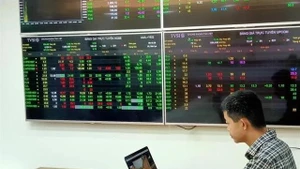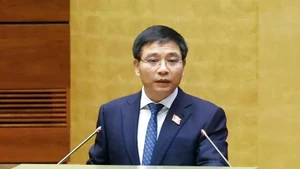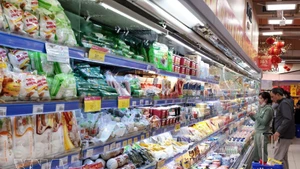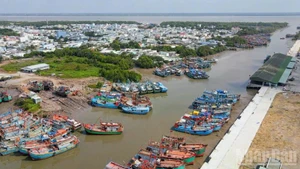In early spring, the government and leaders of industries held a discussion with Nhan Dan Newspaper about the priority actions in each field to ensure the goal of promoting growth on the basis of maintaining macroeconomic stability; controlling inflation; ensuring large balances and high surpluses; promoting the implementation of strategic breakthroughs; restructuring the economy in association with growth model innovation; and improving productivity, quality, efficiency, resilience and competitiveness of the economy.
Deputy Prime Minister Ho Duc Phoc, Member of the Party Central Committee:
Increasing the budget's resilience to fluctuations
In 2024, the world and regional situation has continued to evolve in a rapid and complicated manner with few favourable conditions. Overcoming difficulties and challenges, Vietnam's socio-economic situation has continued to recover and develop, achieving many important and comprehensive results in all areas; it is expected to achieve and exceed the main targets set in Resolution No. 103/2023/QH15.
It is worth noting that most budget revenue areas have met and exceeded estimates. It is expected that up to 52 localities will meet and exceed estimates. Economic growth has recovered positively, with the whole year estimated at about 7%, exceeding the target set by the National Assembly (6-6.5%), and international financial organisations and institutions have positively assessed the growth prospects.
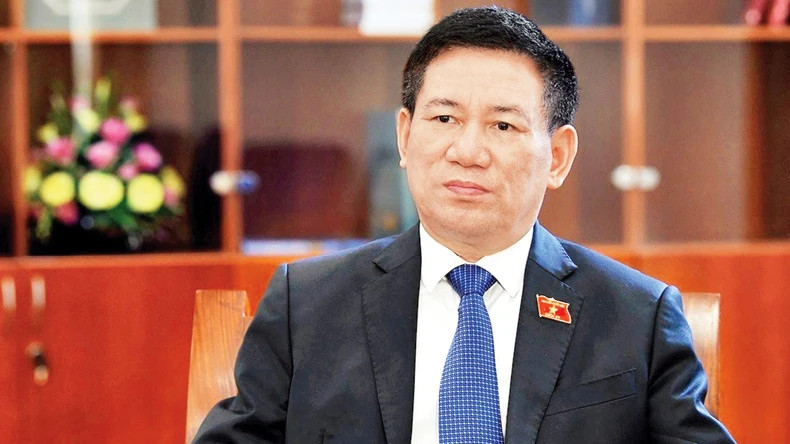 |
| Deputy Prime Minister Ho Duc Phoc, Member of the Party Central Committee |
Regarding the state budget estimate and allocation for 2025, the estimate is 1.96 million billion VND, an increase of 15.6% compared to 2024. The budget mobilisation rate is equal to 16% of GDP, whereby the domestic revenue estimate is 1.6 million billion VND, equal to 85% of total revenue, an increase of 6.1%. The above estimate is assessed positively, clearly demonstrating sustainability as well as the ability to withstand impacts in the context of the domestic and foreign socio-economic situation that still has many potential risks and challenges.
However, due to economic fluctuations; The real estate market has not shown signs of stability, the progress of equitisation and divestment of state capital in recent times has been slow, the pressure to balance expenditures is still high, especially expenditures for important infrastructure projects, urgent tasks, politics, foreign affairs, national defence, security, and social security.
Therefore, in management, the government will continue to carefully review and report to competent authorities to handle shortcomings while allowing localities with large sources of salary reform to be used to adjust a number of policies on social security, streamlining payroll — a national strategic plan; and investing in regional and national connectivity projects and key national projects in cases where localities commit to ensuring salary reform sources until 2030 and do not request support from the central budget.
This provides a solid foundation for building a medium-term, three-year state budget financial plan (2025-2027), which is the basis for stabilising the macro economy and ensuring major balances. Based on the 5-year budget target, with orientation to 2030, the government will continue to restructure to prioritise development investment spending, ensuring spending on defence, security, socio-economic tasks, public sector salaries, social security policies. Thereby, the government will also continue to prolong the period of budget stability, increasing the budget's resilience to unusual fluctuations.
Nguyen Thi Hong, Member of the Party Central Committee, Governor of the State Bank of Vietnam:
Proactive, flexible and synchronous management of monetary policy tools
To achieve the socio-economic development target for 2025 approved by the 8th session of the 15th-tenure National Assembly on "Continuing to prioritise promoting growth, maintaining macroeconomic stability, controlling inflation, ensuring major balances of the economy", the State Bank of Vietnam and the banking sector will continue to focus, make efforts and remain determined to resolutely, synchronously, effectively and substantially implement the key tasks and solutions of the sector to contribute to the successful implementation of the set goals. Specifically, they will:
Closely monitor developments and the world and domestic economic situation to proactively, flexibly and synchronously manage monetary policy tools; and harmoniously and closely coordinate fiscal policy and other macroeconomic policies to support economic growth associated with inflation control, thus contributing to macroeconomic stability.
 |
| Nguyen Thi Hong, Member of the Party Central Committee, Governor of the State Bank of Vietnam |
Implementing credit solutions in line with macroeconomic developments and inflation, meeting credit capital needs in line with the economy's capital absorption capacity; directing credit institutions to grow credit safely and effectively, directing credit to production, business and priority sectors that are economic growth drivers according to the government's policy, contributing to promoting economic growth; continuing to implement specific credit programmes and policies for a number of sectors and fields under the direction of the government and the prime minister.
Resolutely implementing the project on "Restructuring the system of credit institutions associated with handling bad debts in the period of 2021-2025". Focusing on implementing the plan to handle weak credit institutions, restructuring commercial banks under special control according to the direction of competent authorities.
Strengthening close supervision of the operations of weak credit institutions with many shortcomings in their operations. Promoting bad debt handling, improving credit quality, and preventing and minimising new bad debts.
Implementing solutions in the project on developing non-cash payments in Vietnam in the 2021-2025 period; plan for digital transformation of the banking sector to 2025, with a vision to 2030; and continue to coordinate with the Ministry of Public Security to implement Project 06 on developing applications of population data, identification and electronic authentication to serve national digital transformation in the period of 2022-2025, with a vision to 2030.
Completing the banking legal system, creating a synchronous and favourable legal basis for monetary policy management and banking operations; and improving the credit rating and trust of people and businesses in banking mechanisms, policies and operations.
The State Bank of Vietnam will supervise as the entire industry simultaneously and effectively implements the Strategy for the Development of the Vietnamese Banking Industry to 2025, with a vision to 2030; the National Strategy for Inclusive Finance to 2025, with a vision to 2030; and the programmes, plans and projects issued by the industry, thus contributing to creating an important premise for Vietnam to implement the five-year Socio-Economic Development Plan (2026-2030).
Le Minh Hoan, Member of the Party Central Committee, Minister of Agriculture and Rural Development:
Expanding agricultural export markets
A challenging year due to the impacts of natural disasters has come to an end. With just one storm No. 3 making landfall in the northern provinces and cities, the total damage was about 81.5 trillion VND, of which the damage to the agricultural sector was 30.8 trillion VND, accounting for 38%.
Above all, the agricultural sector has affirmed its ability to withstand epidemics and natural disasters by being proactive, positive, and creative in advising the government and the prime minister and coordinating with ministries, branches, and localities to resolutely and synchronously implement the tasks and solutions. The transformation in thinking, from agricultural production to agricultural economy, from single-sector development to multi-sector cooperation and development continues to be promoted.
Similarly, the integration of multiple values in agricultural, forestry and fishery products as well as the shift from agricultural supply chains to the development of active industry chains have been implemented. As a result, agricultural, forestry and fishery production and business activities have been stable, while plant and animal diseases have been basically controlled, reducing damage and ensuring good supply of goods, especially food and foodstuffs for domestic consumption and export.
Solutions to open the market and sign new orders have been effective and brought good results, with total export turnover having increased by 20.2%. The project "Sustainable development of one million hectares of high-quality and low-emission rice cultivation associated with green growth in the Mekong Delta by 2030" is being actively implemented, bringing initial positive results.
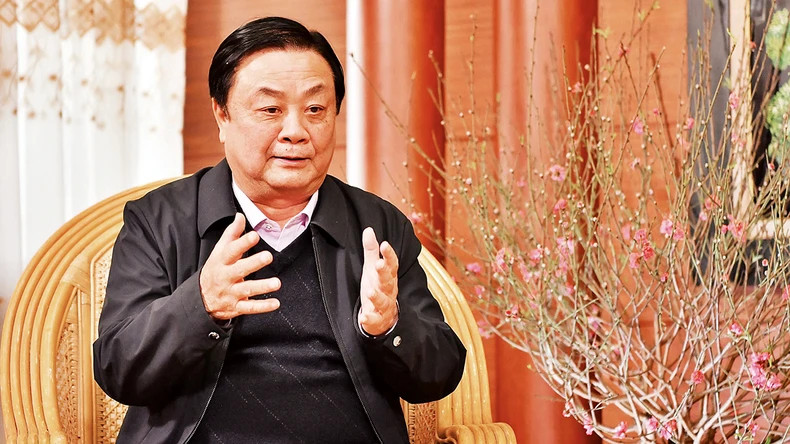 |
| Le Minh Hoan, Member of the Party Central Committee, Minister of Agriculture and Rural Development |
The new era of the country is opening many new opportunities and chances for the agricultural sector, but there are also many difficulties and challenges to face. In 2025, many countries will implement policies to protect domestically produced goods, and promote agricultural production to proactively supply sources.
The agricultural sector, rural areas and northern localities continue to focus on restoring agricultural production after storm No. 3. The weather is changing abnormally, notably including the risk of flooding and landslides in the northern provinces, and saltwater intrusion in the Mekong Delta provinces.
Therefore, along with implementing solutions well in each field, we need to continue to promote international cooperation, develop markets to promote domestic consumption and export of agricultural products. At the same time, relevant agencies continue to handle market issues to facilitate the export of agricultural, forestry and fishery products; implement projects to promote the export of agricultural, forestry and fishery products to markets such as China, the US, and Japan.
In the field of irrigation and natural disaster prevention, along with closely monitoring the weather, water resources, rain, floods, and saltwater intrusion to direct timely responses, support authorities at all levels and people to proactively respond and overcome the consequences of natural disasters promptly and effectively, it is necessary to focus on implementing groups of tasks and solutions to restore production and stabilise the population according to the direction of the government and the prime minister.
Nguyen Chi Dung, Member of the Party Central Committee, Minister of Planning and Investment:
Breakthrough development, confidently rise
2025 is a year of special significance in preparing and consolidating the foundation for the 2026-2030 period.
Implementing the leadership spirit of the Party and State, the planning and investment sector has determined the motto of "breakthrough development, confidently rise" to proactively carry out the sector's tasks, including:
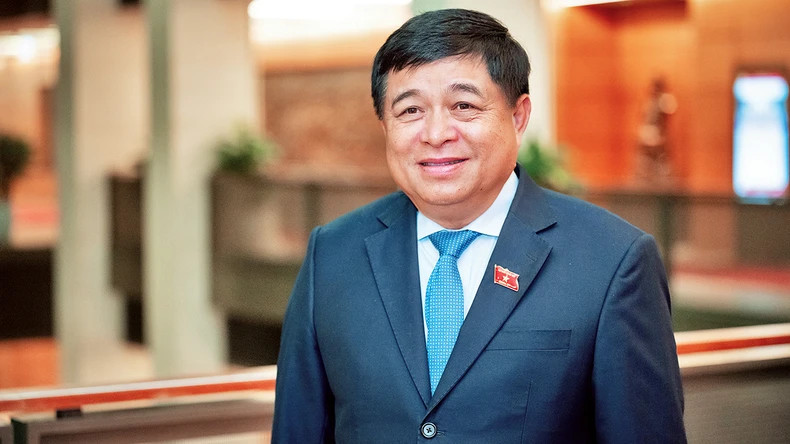 |
| Nguyen Chi Dung, Member of the Party Central Committee, Minister of Planning and Investment |
Firstly, closely follow and grasp the situation, promptly report and advise on policies and solutions for socio-economic development management, prioritising the promotion of economic growth in conjunction with maintaining macroeconomic stability, controlling inflation, and ensuring major balances of the economy.
Secondly, identifying institutional breakthroughs as "breakthroughs of breakthroughs" to promote development, while continuing to innovate thinking in building and perfecting institutions and laws.
Thirdly, focusing on advising, directing, urging, and removing difficulties and obstacles to promote disbursement of public investment capital; completing the target of 3,000 km of expressways; commencing investment in railway lines connecting Vietnam-China; starting the high-speed railway project on the north-south axis; and accelerating the progress of key projects.
Fourthly, effectively promoting the role as the standing agency of the Steering Committee in reviewing and removing difficulties and obstacles related to projects, contributing to unlocking large resources that are being backlogged, immediately contributing to growth, production, business, and state budget revenue in 2025.
Fifthly, accompanying enterprises, cooperatives, and business households.
Sixthly, strengthening cooperation and economic dialogue with comprehensive strategic partners, strategic partners, multinational corporations, and strategic investors to attract large investment projects in a number of areas such as chip manufacturing, semiconductors, artificial intelligence. Effectively implementing the "green channel" mechanism for high-tech projects in industrial parks, so that projects can start construction and come into operation soon.
Seventhly, promoting the effectiveness of the operations of regional coordination councils; ensuring the progress of planning implementation, synchronisation, and close connection between investment in strategic infrastructure projects and exploitation of new development corridors.
Eighthly, promoting the effectiveness of the National Innovation Centre, promoting the development of an innovation ecosystem and creative startups; and developing human resources for the semiconductor industry.
Ninthly, improving the capacity of analysis, forecasting and statistics to better meet the requirements of timeliness, accuracy and objectivity in serving macroeconomic consulting and management.
Tenthly, promoting economic restructuring; researching and advising on specific solutions, mechanisms and policies to promote the development of new economic models, green transformation, and circular economy.
Nguyen Kim Son, Member of the Party Central Committee, Minister of Education and Training:
Creating high-quality, aspirational human resources
The Resolution of the 13th National Party Congress sets the goal that by 2030, the 100th anniversary of the Party's founding, Vietnam will be a developing country with modern industry and high average income; and by 2045 — the 100th anniversary of the country's founding — Vietnam will become a developed country with high income. This is a very big goal, demonstrating the aspiration to "stand shoulder to shoulder with the world powers" as per President Ho Chi Minh's wish.
In the immediate future, to achieve the goal by 2030, the human factor plays a fundamental, important, and decisive role, especially the development of high-quality human resources. To do that, education and training need to have strategic, fundamental, and comprehensive breakthroughs.
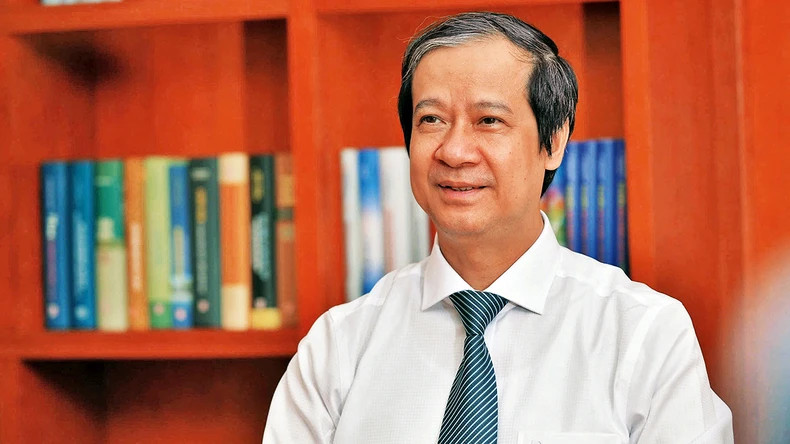 |
| Nguyen Kim Son, Member of the Party Central Committee, Minister of Education and Training |
In order to have high-quality human resources with capacity, qualities, skills, aspirations and social responsibility, it is necessary to achieve the goals set out in the general education program, aiming at developing the capacity and qualities of learners, and comprehensively innovating and modernising higher education. In addition, the whole sector also focuses on building a team of teachers and scientists — those who will carry out strong and in-depth innovation in the coming time.
In particular, it is necessary to focus on developing a team of scientists with the same level as those in advanced countries, with leading experts with international scope and influence, especially a team of experts in key fields, new technology and techniques, targeting human resources in the fields of artificial intelligence, semiconductor chips, new energy, and biotechnology. The fields will have great demand for socio-economic development in the next 5-10 years.
Along with the human factor, institutional breakthroughs are also needed. In the coming time, the education and training sector will advise on amending and supplementing current laws and propose the development of new law projects to pave the way for development such as: amending the Law on Education, the Law on Higher Education; proposing, developing and promulgating the Law on Teachers, and the Law on Lifelong Learning.
In addition, it is necessary to pay attention to devoting resources to investing in facilities, modernising universities, colleges, and vocational training facilities; implement a number of projects to enhance facilities for schools at all levels in conjunction with innovating financial mechanisms for education. Furthermore, it is necessary to create conditions to attract socialised resources and increase the responsibility of organisations, enterprises, and corporations in need of human resources.
In the spirit of the Politburo’s Conclusion No. 91-KL/TW (dated August 12, 2024) on implementing fundamental and comprehensive innovation in education and training, the education and training sector is also submitting to the government a project on developing skills for learners from high school to university; a project on training in the fields of new technology, engineering, and cutting-edge technology to implement the strategy for developing science, technology and innovation, and the strategy for developing the semiconductor industry, to meet the requirements for the country's socio-economic development in the new period.
Nguyen Van Hung, Member of the Party Central Committee, Minister of Culture, Sports and Tourism:
Decisive action - Aspiration to contribute
The culture, sports and tourism sector is excited and proud to have made efforts to contribute to the common achievements of the country. The whole sector continues to resolutely change the fundamental and substantive state management work through the law and by legal tools.
Accordingly, the work of advising on the construction of new and amending, supplementing and perfecting institutions has achieved many very important results, with the highlight being the National Assembly passing Resolution No. 162/2024/QH15, approving the investment policy of the National Target Programme on Cultural Development for the period 2025-2035 and the Law on Cultural Heritage (amended) with many new policies, and creating and unlocking resources for the development of culture, sports and tourism.
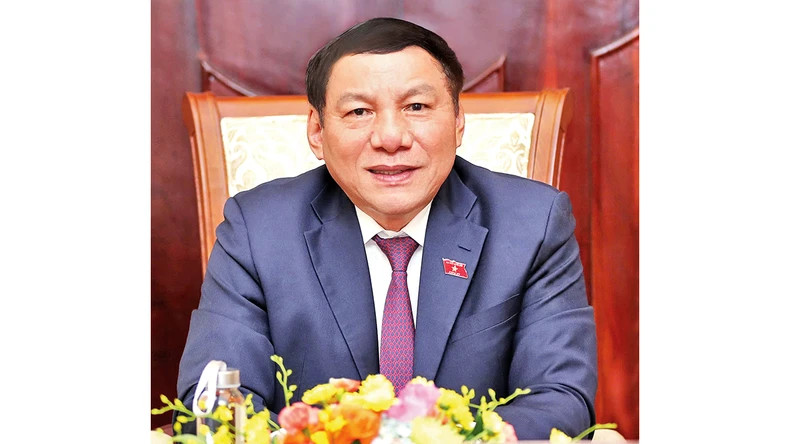 |
| Nguyen Van Hung, Member of the Party Central Committee, Minister of Culture, Sports and Tourism |
The cultural environment continues to receive more substantial investment and care, and many good models have been formed from residential areas, agencies and businesses. Cultural industries have made very proud developments with many elaborate and modern programs and works of art that not only meet the people's need to enjoy art, serve political tasks but also contribute to positioning Vietnamese culture in the international arena.
International cooperation and exchange in culture have been strengthened, thereby creating conditions for Vietnamese culture to reach out to the world, absorbing the cultural quintessence of humanity. Sports for all and high-performance sports continue to have steps of development. Tourism has grown strongly, reaching the finish line with very impressive numbers: Nearly 110 million domestic visitors; nearly 17.5 million international visitors, total revenue estimated at 840 trillion VND, making a substantial contribution to the country's economic and social growth and development.
The achievements of 2024 are an important premise for the culture, sports and tourism sector to confidently enter 2025 with many important tasks: Focus on directing and effectively organising the assigned tasks to serve Party congresses at all levels and the 14th National Party Congress, as well as important events of the Party and the nation.
Building a synchronous and fundamental institutional system; strongly changing the leadership, management, governance and policy implementation methods towards deep decentralisation to localities and strengthening inspection and examination work; building a streamlined organisation of the Ministry of Culture, Sports and Tourism, operating efficiently and effectively in association with a team of professional and increasingly proficient and modern cadres, civil servants and public employees.
Focusing on building a cultural environment with depth, wide coverage, and substance. Effectively promoting the values of cultural heritage combined with selectively absorbing the quintessence of human culture, through expanding cooperation and cultural exchange with countries in the region and the world. Developing cultural industries to truly become smokeless industries with high intellectual and creative content and competitiveness, and approaching countries with developed cultural industries.
Perfecting institutions, resources, human resources, investing in key and focal points for sports development, aiming to reach the continental and world level. Implementing breakthrough solutions to develop tourism quickly and sustainably, truly becoming a spearhead economic sector according to the Party's resolution and the State's policies.
 |
| High-altitude fireworks at Hanoi |
